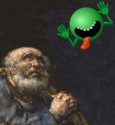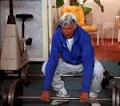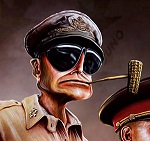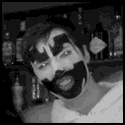|
RaoulDuke posted:Finished House of Leaves earlier today. Parts of it were very enjoyable and definitely had some interesting stuff going on. A bit tough to sludge through at times and nothing life changing but I wish I was more willing to really go at it slowly trying to decipher all the various codes etc. etc. but I think its worth even a casual read like I did. I wish more books took chances like this one even if it wasn't my favorite I think different formatting plots etc. etc. opens up the door for scope of a book and its themes. I read it pretty casually too, and found it surprisingly entertaining. I thought I'd have to grind through a lot of weird puns and clues a la Finnegans Wake, but it was pretty straightforward.
|
|
|
|

|
| # ? May 14, 2024 06:51 |
|
I just finished Crime & Punishment. Overall, it was definitely an enjoyable book, but I just think it was way too long. The plot really didn't pick up until the sixth and final section, and all the rest seemed jam-packed with superfluous dialogue and events. I read The Brothers Karamazov, which was a good 400 pages longer, and it felt like C&P took twice as long to read. I also finished The Metamorphosis last night, and I enjoyed it. The whole thing is kind of  , but I liked the awkward explorations of living as a beetle/monster. I thought it was funny how he kept thinking he'd just get up and go back to work at the firm, even though he was well aware that he was no longer human. , but I liked the awkward explorations of living as a beetle/monster. I thought it was funny how he kept thinking he'd just get up and go back to work at the firm, even though he was well aware that he was no longer human.Also, gently caress introductions that spoil the plot. What the gently caress is wrong with those people? I don't need to hear your interpretation of specific plot elements before I read the loving book. Good introductions are worth reading, but you never know if they're gonna go douchebag on you and spoil something. In my experience, it's about a 50:50 chance.
|
|
|
|
Anunnaki posted:Also, gently caress introductions that spoil the plot. That's why I usually read the introduction last, if at all.
|
|
|
|
I just finished "Jitterbug Perfume" by Tom Robbins. It was completely awesome. I might read "Skinny Legs and All" next. (USER WAS PUT ON PROBATION FOR THIS POST)
|
|
|
|
Have recently finished The Killing Joke by Anthony Horowitz and Your Next-Door Neighbor is a Dragon by Zack Parsons. Joke is a lovely, light comedy/thriller/adventure about a man who decides to follow a joke back to it's source. Itís got a few canny observations, some laughs, and a lot of grins. It's not earth shattering stuff; itís just very fun and, I thought, very solidly written. The only way I can describe it would be to ask you to imagine that Nick Hornby had died in 2001 instead of Douglas Adams. Then imagine Adams had been asked to flesh out and write a novel from an outline left behind by Hornby. Or, imagine a British Christopher Moore. If youíre a fan of British humor, Iíd recommend it highly. Dragon is very funny and of my favorite type of literature: comedy semi-fictionalized sociology. Itís a pitifully underrepresented genre and Parsons does it a great service here. I took issue with the narrative only twice: Robocop could totally satisfy a woman, with with only the lower half of his face (but he has oh so much more in his arsenal) and I forget the other issue I had. It probably goes without saying on an SA sub-forum but if you enjoy his front page stuff youíll certainly enjoy this. King Plum the Nth fucked around with this message at 01:03 on Aug 10, 2009 |
|
|
|
Just finished Science of the Discworld by Terry Pratchett and a couple of co-authors. I really enjoyed it (less so towards the end), since it told a normal, fictional, amusing discworld story with every other chapter being an analysis of scientific principles brought up in the previous chapter. It was written very well, you can understand it with even just a basic grasp of science, since the purpose of the novel is to break down some basic assumptions people make and explore what they term "lies to children". They give examples of such "lies" and why they're necessary to build up knowledge, but the book never gets boring or bogged down with the science. I really liked it and it was refreshingly different from the normal Pratchett/Discworld stuff.
|
|
|
|
I just finished The Big Nowhere by James Ellroy. The last 100 or so pages were incredible. I read it in one sitting. He ties up his pretty complex plot with a great ending. I admit I was a bit lost half way through the book with all of the characters but it all makes sense by the end. Also, the whole wolverine thing was pretty hosed up but unique. I still prefer The Black Dahlia as my favourite Ellroy book, but this is up there too. 4/5
|
|
|
|
Goug posted:It was completely awesome. Oh, you can do better than that. DROP AND GIVE ME TWENTY (words)!
|
|
|
|
Anunnaki posted:Also, gently caress introductions that spoil the plot. What the gently caress is wrong with those people? I don't need to hear your interpretation of specific plot elements before I read the loving book. Good introductions are worth reading, but you never know if they're gonna go douchebag on you and spoil something. In my experience, it's about a 50:50 chance. You know what's even worse? The paragraph or two on the back of the book that spoils major plot elements. Even a sentence as harmless as "After his wife was murdered, Jack Maincharacter sets off..." Well I was six chapters in before the wife got offed. I think that was supposed to be a loving surprise, assholes. I've learned to read nothing in a book that the author didn't write in context until I'm done reading the original text. (That is, if it's an Nth anniversary edition to which the author contributed a new forward, I'll wait until the end to read it. Ditto any other forwards, introductions, flaps, backs.) First impresions are so important. That said, I just recently read The Metamorphosis for the first time myself. I love how weird, claustrophobic, and generally hopeless Kafka makes their little world feel. Definitely need to reread it a couple of times, though, maybe start with the introduction this time. I gather there's a ton of symbolism and metaphor and whatnot that I didn't pick up on the first time. Gregor Samsa is a Messianic figure? Dammit. I need to take some lit classes. King Plum the Nth fucked around with this message at 21:30 on Aug 10, 2009 |
|
|
|
I just finished The Informant by Kurt Eichenwald, which is supposed to be made into a movie with Matt Damon and released this October. It was a great book about an FBI investigation into a company and the utter clusterfuck that set in after the lawyers entered the picture. Not because they're incompetent or anything, which the book goes to show they're not, but simply because of all the political dimensions that set in with such a major case. Really, while I'm not surprised at the crime, it's something we need to guard against and it really is a giant finger in the eye of people who go on about how the free market can regulate itself, as if market forces were akin to gravity.
|
|
|
|
King Plum the Nth posted:You know what's even worse? The paragraph or two on the back of the book that spoils major plot elements. Even a sentence as harmless as "After his wife was murdered, Jack Maincharacter sets off..." Well I was six chapters in before the wife got offed. I think that was supposed to be a loving surprise, assholes. I got a copy of Rosemary's Baby from the library which had a new AFTERWORD from the author which is the way to loving do it.
|
|
|
|
Just finished The Selfish Gene by Richard Dawkins. It was pretty much one of the best books I've ever read in quality. No matter what your knowledge of evolution is, this book will set you straight and/or take you much further. Tackles big concepts with ease. Definitely a must read for all people everywhere.
|
|
|
|
I just finished A Woman in Berlin - a truly chilling read, it is a first-person diary account of an anonymous woman who was present in Berlin when it was effectively sacked by the Russians at the end of the second world war. I echo one of the endorsements on the front that says 'Among the most chilling indictments of war I have ever read.... Everybody...ought to read it'
|
|
|
|
I haven't had much time to do leisure reading except right before bed, so I've been trying to keep it light. Of course, this mostly means re-reading things I've already finished. After finishing off the first five Dune books (I lost Chapterhouse somewhere, dammit), I went for something lighter because I'm a big Young Adult Fiction dork. I just finished The Miserable Mill, Book 4 in the A Series Of Unfortunate Events series, and I came away somewhat puzzled. I know I'm overthinking it, but there's a lot of allegory and not-subtle-at-all commentary in the Lemony Snicket books. It's pretty obvious by the end of this book that Count Olaf (and his side of the VFD schism) are allegory for governmental abuse of power (with Mr. Poe playing the "It's legal, so it's moral" foil to our protagonists arguing against injustice). I mean, he named the optometrist in that book Georgina Orwell. Hits you upside the head with that like a ton of bricks. I think it's no coincidence that the word "Lucky" featured so prominently in that book (including being a hypnosis command word), since the prevailing notion of the police state mentality is that you should feel lucky that you've been demoralized, dehumanized, put under horrible conditions and had every aspect of your life controlled. The rest of the books have varying degrees of additional subtext that I'm ashamed I missed the first time through.
|
|
|
|
RaoulDuke posted:Finished House of Leaves earlier today. Parts of it were very enjoyable and definitely had some interesting stuff going on. A bit tough to sludge through at times and nothing life changing but I wish I was more willing to really go at it slowly trying to decipher all the various codes etc. etc. but I think its worth even a casual read like I did. I wish more books took chances like this one even if it wasn't my favorite I think different formatting plots etc. etc. opens up the door for scope of a book and its themes. I also just finished House of Leaves and read it in a style similar to this. For some reason I found it incredibly hard to read it whenever either Zampano or Johnny would talk about one thing, endlessly adding example upon example, adding comma after comma, never ending their thoughts, just continuing on and on, like something that never ends, and then it would kind of transition into another nonsensical topic, and whenever I tried to read through it I'd feel like I was falling asleep. Not that it was boring me, but it felt kind of like those completely off the wall thoughts you get when you're super tired. Anyway, now I'm kind of itching for some good horror that isn't supposed to mean anything. Maybe the Recommendation thread will provide answers.
|
|
|
|
A re-read of Viriconium by M. John Harrison - a complete collection of his 3 Viriconium novels (The Pastel City, A Storm of Wings, In Viriconium) and several short stories set in Viriconium. Viriconium, an ancient city in the far future of an even more ancient Earth, is always different in each story, reflecting the over-arching theme of reality blurring, with people, events and locations existing only as half-remembered fragments. Not that grabbed by the short stories (I do like A Young Man's Journey To Viriconium), but the novels are some of the best stuff I've read in the fantasy genre in terms of prose and depth of imagination.
Encryptic fucked around with this message at 01:43 on Aug 13, 2009 |
|
|
|
muscles like this? posted:I got a copy of Rosemary's Baby from the library which had a new AFTERWORD from the author which is the way to loving do it. And is exactly how Nabokov does it, no forewords, only afterwords. This is the opposite of Alfred Appel, who in the annotated version of Lolita foreword, manages to spoil Ada, Pale Fire, Despair, and Laughter in the Dark. And the annotations manage to have spoilers for Mary and the Enchanter. I get that it's directed at people who are familiar with Nabokov's work, but that's kinda a lot. That's just the Nabokov works as well. Content: I've completed Kavalier and Clay by Michael Chabon. It was excellent for about 300 pages. Then it went into the stuff that Chabon is so often accused of; gays, trying to write large scale works, and incomprehension of the female gender. Rosa was as cardboard a character as anything from paperweight fantasy and that really hurt it. I don't think I'd read anymore Chabon after that, especially since so many people think its his best work.
|
|
|
|
The Strain by Guillermo Del Toro and Chuck Hagan. I have mixed feelings about this one. For those who haven't heard of it the basic premise is that the aging richest man in the world makes a deal with an ancient vampire lord to give him access to New York City in exchange for immortality. In concept the vampires are fairly similar to the ones in Blade 2 (since you know, Del Toro designed those.) While it was an interesting read the book was hamstrung by the fact that its "first in a trilogy" so things don't exactly get tied up in the end and they can't really decide if the vampires are scientific or supernatural. A big chunk is devoted to basically the science of the vampires but then there's stuff like silver hurts them, they don't show up in a silver backed mirror you only see a blur and the biggest problem with the scientific theory, the vampire lords have telepathy. It just kind of stands out.
|
|
|
|
QVT posted:And is exactly how Nabokov does it, no forewords, only afterwords. This is the opposite of Alfred Appel, who in the annotated version of Lolita foreword, manages to spoil Ada, Pale Fire, Despair, and Laughter in the Dark. And the annotations manage to have spoilers for Mary and the Enchanter. I get that it's directed at people who are familiar with Nabokov's work, but that's kinda a lot. That's just the Nabokov works as well. I've voiced this complaint in a few threads concerning Nabokov, and it's especially unforgivable as Appel explicitly intended his annotations to be used in academic courses. A big part of teaching literature is to encourage students to go read other books, so what's to be gained by spoiling a big chunk of an author's most famous works? It's especially stupid considering Appel was a professor. That said, every Nabokov book I own (with the exception of the annotated Lolita) has an introduction by Nabokov as author, and all are Vintage editions. Were these originally afterwords? Just finished Gomorrah by Roberto Saviano a few days ago. It's about the Camorra organized crime syndicate in Naples. Started off really interesting, but there's absolutely no narrative thread connecting anything after the first two chapters, and it immediately devolves into info dumps. I can admire that the guy put his life on the line - he names names and is completely fearless about exposing the corruption in Italy. However, he'll jump between ideas and characters arbitrarily (sometimes page to page, paragraph to paragraph, and - most annoyingly - sentence to sentence), not to mention there are big chunks of purple. It was sporadically interesting, but because of the complete lack of organization, it took over a month to plow through.
|
|
|
|
Ultramarine, by Malcolm Lowry. This book kicked my rear end. Basic premise is that a late 1920s British youth fresh out of school (well, pretty much fresh out of school) goes to work on a tramp steamer ship ostensibly to find himself. He struggles to prove himself a man and gain the acceptance of the crew, who mostly consider him an effete nuisance, and to do so while remaining faithful to his first love who remains at home. This sounds somewhat like a Captains Courageous-esque work, but it's entirely different. Lowry drops classical references with some regularity, modern (from his perspective) European references, Norse references, has sections of dialogue in German, sections of Greek poetry in the Greek language and alphabet interspersed in stream-of-consciousness sections, and a number of generally interesting constructs. Did I mention stream-of-consciousness? Because the author switches gears from seamen joking bawdily in slang to his protagonist musing about philosophy, his girl and his place in the world, often in dense and ostentatious King's English, and back again with speed that taxes your mental clutch. There are some excellent humor scenes both on the ship and in portside bars/brothels/etc which lighten both the mood and the read nicely, although here too Lowry tends toward giving the reader whiplash from time to time. You learn quite a bit about said protagonist later on in the book, and the plot progression and pacing felt odd to me the whole shebang takes place over the course of two days of a 12-month voyage. I'm not sure whether I'm satisfied with then ending, although I definitely enjoyed the read, and the way that some synapses which I use too seldom were really stretched and worked out. This will probably come off other than I'd like it to, but I'd compare the experience to drinking a full-bodied stout or porter ale with a robust flavor and a slightly-too-bitter aftertaste. I'll certainly re-read this book at some point, but not for a while, I think.
|
|
|
|
QVT posted:I don't think I'd read anymore Chabon after that, especially since so many people think its his best work. Anyone who thinks that is a fool, Wonder Boys and Mysteries of Pittsburgh are both way, way better. If you haven't read those then by God do not let K&C stop you.
|
|
|
|
I finished Murakami's The Wind-Up Bird Chronicle a few hours ago, and... I really don't know what to say. The book just sort of, well, ended. I felt like yes, there were some plot threads that were loosely tied up Kumiko offing her brother, Mamiya fully fleshing out WHY he ended up lonely and isolated, and the disappearance of Toru's mark (well, kinda), but it didn't feel like Toru's plot was wrapped up well - he just drifts through the last 100 or so pages. Also, all the dream stuff was a bit jarring to me - as it was hard to differentiate between what was real and what wasn't in those sequences. I hated how a few characters were introduced to be major players, who then dropped off after about 50-100 pages - it just rubbed me the wrong way. I wanted to see them fleshed out a bit more, to have more of an impact on the plot, but nope, can't have that. I'll definitely be reading more Murakami in the future, but I think I'm going to stick with his shorter stuff (starting with South of the Border, West of the Sun before diving into say, Hard Boiled Wonderland and the End of the World).
|
|
|
|
Das Nibelungenlied, an epic poem written during the 13th century. Very entertaining, and considering an important influence on Tolkien as he wrote the Lord of the Rings series. Surprisingly not too difficult to wade through (though I had a pretty new translation), it's sort of hard to figure out just who the agonist is. At first it's pretty clear that Sigfried is the one you should be rooting for, but they kill him off in the middle of the book. The guy you're supposed to hate (Hagen) actually morphs into a sort of hero at the end, and Sigfried's wife Kriemhild does an almost complete 180 in terms of character development. The most annoying thing about the book is it's overuse of foreshadowing; I guess the people who would hear the story at the time it was written were already aware of the main plot points, but not being a member of the 13th century gentry it gets annoying when the narrative pretty much tells you who's going to die at the end while you're still getting through the middle of the story. The chapter titles also pretty much give up the whole story. Anyways, I recommend it to anyone who wants a good story in a Medieval setting.
|
|
|
|
Roybot posted:I've voiced this complaint in a few threads concerning Nabokov, and it's especially unforgivable as Appel explicitly intended his annotations to be used in academic courses. A big part of teaching literature is to encourage students to go read other books, so what's to be gained by spoiling a big chunk of an author's most famous works? It's especially stupid considering Appel was a professor. That said, every Nabokov book I own (with the exception of the annotated Lolita) has an introduction by Nabokov as author, and all are Vintage editions. Were these originally afterwords? I guess this is my fault for not defining my terms. Nabokov includes forewords to all his works. These are markedly different from an "introduction" which seems to be what most people can agree on disliking. He'd mostly just mention when and where he wrote it and how little he liked his translator(via how strongly he says he "corrected" them) instead of discussing the work. They were mostly written for his translated works in either 64 or 65 and for the English ones later. Ballsworthy posted:Anyone who thinks that is a fool, Wonder Boys and Mysteries of Pittsburgh are both way, way better. If you haven't read those then by God do not let K&C stop you. Hey, Seth from the OC tries to give it to Summer in season one. That's a sparkling recommendation. I'll pick up one of those two if the library has them. He actually wrote Mysteries of Pittsburgh for his Masters Thesis at the university I go to and I've mentioned a couple times here before how annoying everyone in our Writing program comparing themselves to him is.
|
|
|
|
Ivan Drago posted:The Count of Monte Cristo by Alexandre Dumas. If you can, get the unabridged. Not one word in it is too much. Izzy Mandelbaum posted:I just finished The Big Nowhere by James Ellroy. I re-read the last paragraph 4-5 times when I finished the book. Ellroy is an amazing writer, and I just love it when a book ends like a well made glove. Everything just fits. I just finished Maskerade by Terry Pratchett which I was told was the best introduction to Terry Pratchett. I'll give him credit, the man is funny, but the plot was pretty slim and easily guessable. I guess you don't read these books expecting a tension filled ride, but I found myself not caring whether I finished it or not. I laughed out loud more than a few times, but it was nothing on the laughs I got from Jonathan Strange and Mr. Norrell, which I would also classify as a comedy book. Raskolnikov2089 fucked around with this message at 23:54 on Aug 13, 2009 |
|
|
|
Finished up Contact by Carl Sagan. It was quite a bit better than the movie (which was pretty terrible as I recall). The plot revolves around the SETI program (called Argus in the book) actually receiving a message from space. There are also bits about religion and scientific skepticism. I thought Sagan treated the religious bits well, I like how he brought religious and scientific pursuits together through the "numinous" concept. That the ability to conceive of things greater than ourselves is part of what makes us human. sexual rickshaw posted:I'll definitely be reading more Murakami in the future, but I think I'm going to stick with his shorter stuff (starting with South of the Border, West of the Sun before diving into say, Hard Boiled Wonderland and the End of the World). Hard Boiled's plot makes more sense than Wind-up's. Or at least, pretty much everything is tied up in a more coherent fashion. appropriatemetaphor fucked around with this message at 04:28 on Aug 14, 2009 |
|
|
|
Izzy Mandelbaum posted:I just finished The Big Nowhere by James Ellroy. Yeah, next to American Tabloid, I'd have to say this is one of my favorite Ellroy reads. I *was* re-reading something else, but I'm tempted to drop that and dig into it again since it has been a while since I read it. I love how tightly controlled it is even as it explodes into insanity by the end. Just happened to re-read an earlier novel by him - Clandestine, which serves as sort of a prequel to the LA Quartet novels (Dudley Smith and his flunkies Breuning and Carlisle feature prominently). A young ambitious cop seizes on a perceived opportunity to advance his career by solving several brutal killings, only to get into more than he bargained for. Compared to his later stuff - Ellroy's characteristic darkness is here but it's not quite as over-the-top brutal and there's actually some sense of redemption. It's a good read all in all, though I'll admit after having read most of Ellroy's novels, I do start to notice he repeats himself a bit - certain snappy lines of dialogue, long backstory reveals near the end, etc. Encryptic fucked around with this message at 06:43 on Aug 14, 2009 |
|
|
|
I just finished Michael Rubens's new book, The Sheriff of Yrnameer. I saw it on the "new releases" counter at my local Borders and picked it up on a whim, thinking the cover looked interesting and any book endorsed by Stephen Colbert on the back couldn't be too bad - I was right. The book is funny, exciting, and full of the a very similar spirit of whimsy and adventure that something Douglas Adams would have written - but at the same time, very distinctly American in its style. It's a great book. If you're into sci-fi or comedy, pick it up. If you're wondering about the plot, it's about a guy named Cole who has a whole lot of unexpected things happen to him that seem to get worse and worse as he attempts to flee from an incredibly polite bounty hunter who's come to collect the (very large) debt Cole owes to a friend of his. Also he wants to lay eggs in Cole's brain.
|
|
|
|
Squid Hat posted:A God Strolling Through the Cool of the Evening by Mario de Carvalho. I picked this up after I saw your post and am about halfway through it. The main character is so dull and like you said, the love story is flat. Not only that, but it's totally out of character for Lucius. I still can't decide what he's about - very ill defined. That said, I love the setting. The author does an amazing job at creating a picture of this small Roman town in my head. Thanks for the lead on the book.
|
|
|
|
Pride and Prejudice and Zombies by Jane Austen and Seth Grahame-Smith I bought this because I wanted an introduction to Austen and thought the original might bore me, but I actually really enjoyed the bits without zombies, ninjas or ultraviolence more than those with it. In some places, the two writing styles gelled pretty well, but in others it just felt like they'd thrown in the word "zombie" and "katana" all over the place. It was pretty entertaining, but I don't think I would read it again. Instead, I'd like to try some real Austen. King Plum the Nth posted:
...which brings me to my next book, Life of Pi by Yann Martel. The British copy I brought from home literally had on the back "Pi finds himself stranded with" and a list of all the animals. Unfortunately, I left this copy in a Travelodge in Portland and had to pick up an American copy, which told me who lives and who dies right there on the blurb. Thanks  I still found this book riveting though, and I'm very glad I finally got round to reading it. It was a good literary pick-me-up after my nonchalance towards Pride and Prejudice and Zombies. The ending was well worth the wait and left the perfect amount of questions for me to answer myself, and I really felt for the characters and found them believable. I should probably get back into reading like I did as a kid.
|
|
|
|
I just finished rereading The Three Musketeers by Dumas. I forgot how truly entertaining the book is, especially once the war begins. Pages moved of their own accord and I lost complete track of time and personal responsibilities as I read about the war between England and France and the smaller personal dramas taking place in the greater conflict. I do realize the ending can be seen as misogynistic, but there are virtuous women throughout the novel (most notably Constance Bonacieux, d'Artagnan's beloved if one loosens the concept of "virtue," as everyone is having extramarital affairs.) Milady's portrayal of the villainous woman does not seem to be an affront to all women, though they do seem to suffer. The queen's love is assassinated, Bonacieux is murdered, Kat is sent away to a convent, and mistresses and lovers are seen as simply the means to an end in many situations (such as the purchasing of supplies for the coming war with England,) and, of course, Milady's eventual execution. The male villains are punished significantly less. The Cardinal's scheming might not always come to fruition, but he loses nothing when his plans are defeated. The Duke met in the earliest pages turns out to be nothing more than a MacGuffin, despite the fierce emotion he dredges up in d'Artagnan in every instance (their eventual reconciliation almost seems an affront to those earliest pages as well.) Despite the fact that the book is almost pure fluff and that Dumas had many ghostwrites who may have been more responsible for the book's content, it is a delightfully entertaining read that is pure escapism. I suppose that's why I liked it so much. edit: Even though it's an old book, I added spoilers just in case. the amber trap fucked around with this message at 17:12 on Aug 15, 2009 |
|
|
|
Camus: A Romance by Elizabeth Hawes. Part bio, part memoir, part literary criticism. Hawes fell in love with Camus and his writing while she was a grad student but never got to meet him because of his tragic death in 1960, so she wrote this book as a kind of love letter to Albert Camus and other readers who've fallen under his spell. The most interesting parts are obviously when she's describing Camus's life and circle of friends, most notably his Algerian roots and how they colored his view of life and an artist's place in it. I was worried that the "memoir" portions where Hawes describes her travels to Camus's haunting grounds would be boring, but she doesn't overindulge so they capture quite nicely the melancholy of trying to recreate the life of a famous dead person. She also spends time discussing all of Camus's works in order and here, too, she keeps things to-the-point and interesting. All of the "parts" flow into each other easily and keep the book moving along its 289 pages at a good pace. If you have any interest in Albert Camus this book is a great read. The Stranger by Albert Camus. After reading the above book I stopped by Half-Price Books and picked up all the Camus I could find. Since The Stranger is always a summer read for high schools around here I had no trouble finding it (for $3 to boot). I love this book for two reasons. One, it's a slow-burn. The entire first half seems so boring and pointless, then it all comes to fruition in the trial. Of course, the point of the trial is to show that all of that stuff in the first half WAS pointless. Second, it's short! The book makes its point and ends. Even if (or especially if) you don't agree with Camus's message- that the universe is indifferent to you and you're going to die so get on with your life already! -at least you can breeze through it. I'm not going to get into any of the symbolism or motifs or lit. theory stuff here, but another plus of the book is that it can stand up to that kind of "serious reading" if you're so inclined, but you can still get the gist of it without all of that. Since I'm planning on reading Camus chronologically I'm skimming some of his collected early essays which are basically groundwork for The Stranger (and all summed up quite well in Hawes book, hence the skimming), then next up is Myth of Sisyphus.
|
|
|
|
I just read City of Thieves by David Benioff, about an unlikely duo on an epic quest for eggs during the siege of St. Petersburg. Beautifully written and with some really good ideas, though I was a little disappointed by the ending. Also Ghost Ocean by S. M. Peters was a fairly good read. Thematically it is much the same as most of Neil Gaimans books, the whole "normal person is suddenly introduced to the supernatural world", but with a darker style. Good entertainment, but like his previous novel it is a bit weak towards the end.
|
|
|
|
Raskolnikov2089 posted:If you can, get the unabridged. Not one word in it is too much. the amber trap posted:I just finished rereading The Three Musketeers by Dumas.
|
|
|
|
Oh my. It's been a while since I've read The Count of Monte Cristo, as I keep lending my (unabridged, don't worry) copy out to friends because I adore the book so much and want to convert them. My copy of The Three Musketeers and Twenty Years After are both from a set I found at a used book store and are too nice to lend. Both are new acquisitions and I haven't actually read Twenty Years After yet, though I'm reading it now, of course. If you liked The Count of Monte Cristo, you will enjoy The Three Musketeers. I will admit that I prefer the Count to the Musketeers, though both works are amazingly similar in tone and pacing (which makes sense, I know, but it bears stating.) Both were written as serials for the newspapers in France, which sold papers much as comics used to do in more modern eras. This explains why both books have such rapid pacing and most chapters leap right into action to move the plot. Not much space is given to character development (more on that in a second) or description. It is presumed that the reader knows something about the locales and events described. It is this rapid progress through the story that draws in the reader. My biggest gripe with The Three Musketeers was the lack of any sort of chronological order. Many times chapters would begin with one character suddenly whisked back hours or days before the events that had seemingly transpired only moments before in order to build suspense or set up a momentous meeting. In The Count of Monte Cristo, we really only follow the actions of one individual, so these jumps don't happen at all to my recollection. In The Three Musketeers, characters seem to be based much more on archetype than anything else which is one of the biggest differences. Porthos is strong and self-centered. Aramis is quiet and concerned with matters of faith. Athos is intelligent and fatherly. D'Artagnan is brash and reckless. These basic traits and descriptions lead the characters by the nose when convenient and are forgotten at other times (typically it will be in the case of d'Artagnan forgetting to be stubborn or hot-headed.) The characters in The Count of Monte Cristo may be a bit one dimensional, but they also seem portrayed as more believable and human. Also, Edmond Dantes changes drastically from someone bright and hopeful to miserable and desirous of nothing more than revenge. Overall, the major difference that comes to mind is simply the tone and atmosphere of the book. While both have their share of scheming, the Musketeers are the ones thwarting the plans of the Cardinal rather than laying out an intricate plot for revenge. D'Artagnan and his allies succeed though a mix of luck, swordsmanship, and inventiveness. This leads to a brighter tone overall. Edmond is a more tragic character and victim, leading to his desire for revenge. I don't want to give away much more of the plot if you intend to read it. (Besides, this is getting a bit long already.) I will happily compare and contrast the two once you've finished reading. It might even be something to look forward to. the amber trap fucked around with this message at 01:46 on Aug 18, 2009 |
|
|
|
I just finished reading Walter M. Miller's A Canticle of Leibowitz It was great, I love post-apocalyptic stories. I still think Pat Frank's Alas Babylon is the best I've read so far
|
|
|
|
If you've read both The Three Musketeers and Twenty Years Later, you should try to get a copy of the Vicomte of Bragelonne, where it all ends. It is weaker (in my opinion) than Count of Monte Cristo, but it is all in all an interesting read. It is in the end kind of bleaker than the other Musketeer books, but it does lead to some interestin endings. Just finished Carl Sagan's Demon Haunted World, it was very interesting and not dry at all. Will have to re-read at least a couple of the chapters, and reading about the state of education was kind of depressing (since some of the stuff mentioned there have a parallel in my country, where there is more than a bt of underfunding in the sciences and such). Just started Thomas Pynchon's The Crying of Lot 49. Don't know what to think of it just yet.
|
|
|
|
the amber trap posted:Dumas...
|
|
|
|
Luisfe posted:If you've read both The Three Musketeers and Twenty Years Later, you should try to get a copy of the Vicomte of Bragelonne, where it all ends. I must sheepishly admit that I did not even know of this book's existance. Now I must search it out. (Thanks for the information though.) Ivan Drago posted:That was an amazing write-up, cheers for that. I'm finishing up Alistair Horne's "La Belle France" right now (just to be reading something) but I plan on grabbing Musketeers immediately. You seem to have a keen interest and it would be enjoyable to have someone to discuss it further after I've finished. Thank you again. I would love to discuss or analyze anything in depth. The Navy doesn't exactly attract well-read or even literate individuals. I miss brainy conversations.
|
|
|
|

|
| # ? May 14, 2024 06:51 |
|
I just finished Martin Eden, by Jack London. What an inspiring, beautiful, and ultimately depressing book. I absolutely loved it, and it is now fairly high up on my list of favorite books. I'm having trouble starting another, though. I'm attempting to chew Martin Eden to the finish, and bits of gristle keep getting stuck in my mouth. Is it really as simple as I think? I feel like there are layers that I'm not getting. For instance, was Martin really such a simple thing as a tool for Jack London to show that Spenserian philosophy leads only to blackness and despair, that the Nietzchean supermen need something to ground them, as Brissenden claims, like the "ideal" of socialism, the slave-morality? It seems to weaken London's argument when one reduces it to such a simple interpretation, but I can't seem to see it any other way.
|
|
|






























